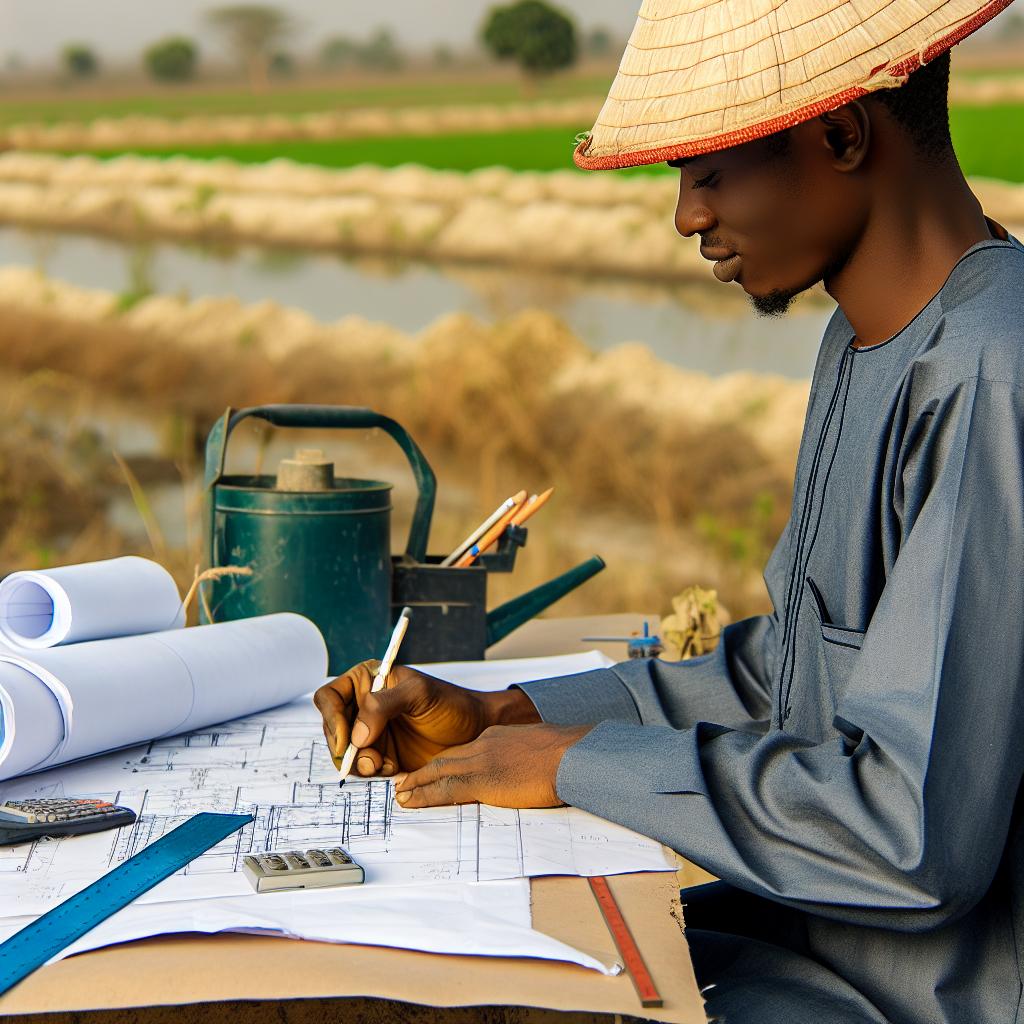Introduction
Irrigation systems are networks of pipes, canals, and other infrastructure used to supply water to crops.
These systems are vital for ensuring agricultural productivity, especially in areas with limited rainfall.
Agricultural engineers play a crucial role in designing efficient and effective irrigation systems.
Types of irrigation systems
Traditional irrigation methods
- Surface irrigation involves flooding fields with water from ditches or canals.
- Furrow irrigation directs water to rows of crops through small channels.
- Flood irrigation spreads water over the entire field, allowing it to soak in.
Modern irrigation techniques
- Drip irrigation delivers water directly to the root zone of plants.
- Sprinkler irrigation mimics natural rainfall by distributing water through sprinklers.
- Center pivot irrigation uses rotating sprinklers on a pivot to water crops in a circular pattern.
Efficiency and effectiveness of each system
- Traditional methods may result in water wastage due to surface evaporation.
- Modern techniques like drip irrigation are more precise and efficient, reducing water usage.
- Sprinkler systems are versatile and can be automated for better water management.
- Center pivot irrigation is suitable for large-scale farming and can cover larger areas effectively.
The Role of Agricultural Engineers
Agricultural engineers play a crucial role in designing efficient irrigation systems for various agricultural operations.
Their responsibilities include analyzing water requirements, topography, and soil types to determine the most suitable irrigation methods.
They must also consider factors such as crop type, climate conditions, and water availability when designing irrigation systems.
Responsibilities and Duties
Agricultural engineers are responsible for designing irrigation systems that optimize water usage and ensure crop health and productivity.
They must conduct site assessments, create irrigation plans, and oversee the installation and maintenance of the systems.
They work closely with farmers to understand their needs and provide solutions that meet their specific requirements.
Qualifications and Skills
To become an agricultural engineer specializing in irrigation systems, one must have a bachelor’s degree in agricultural or biological engineering.
Strong analytical and problem-solving skills are essential, as well as knowledge of computer-aided design (CAD) software.
Excellent communication and teamwork skills are also necessary to collaborate effectively with farmers, agronomists, and other professionals.
Impact of Technological Advancements
Technological advancements have greatly influenced the design of irrigation systems, making them more efficient and sustainable.
Sensors, drones, and remote monitoring systems are now used to gather data on soil moisture levels, weather patterns, and crop health.
This data-driven approach allows agricultural engineers to create precision irrigation systems that deliver the right amount of water at the right time, reducing water waste and enhancing crop yields.
Explore Further: Starting a Career in Mechatronics Engineering
Soil Type and Texture
One key factor that engineers consider is the soil type and texture of the agricultural land.
Different soil types have varying levels of water retention and drainage capabilities.
This can impact the design of the irrigation system.
Crop Type and Water Requirements
Another crucial consideration is the type of crops being cultivated and their specific water requirements.
Engineers must tailor the irrigation system to meet the specific needs of the crops.
This is necessary in order to optimize growth and yield.
Climate and Weather Patterns
The climate and weather patterns of the region play a significant role in designing an effective irrigation system.
Engineers must account for factors such as rainfall levels, evaporation rates, and temperature fluctuations.
This ensures proper water management.
Available Water Sources and Access to Irrigation Technology
Engineers also need to assess the availability of water sources.
These include rivers, lakes, wells, or reservoirs, as well as access to irrigation technology.
The design of the irrigation system will be influenced by the type and amount of water that can be accessed.
You Might Also Like: Role of Land Surveyors in Nigeria’s Infrastructure
Challenges faced by agricultural engineers in designing irrigation systems
Agricultural engineers often face challenges in designing irrigation systems due to limited access to resources and funding.
Developing efficient irrigation systems requires specialized equipment, technology, and infrastructure, all of which come at a cost.
Without adequate funding, engineers may struggle to implement innovative solutions and optimize irrigation practices.
Additionally, limited resources can hinder research and development efforts.
This prevents engineers from exploring new techniques and technologies to improve irrigation efficiency and sustainability.
Environmental concerns and sustainability
Another significant challenge for agricultural engineers is addressing environmental concerns and promoting sustainability in irrigation system design.
The use of water resources for agriculture can have a significant impact on the environment, including water scarcity, soil erosion, and pollution.
Engineers must carefully consider the long-term environmental implications of irrigation practices.
They must work to minimize negative effects on ecosystems and natural resources.
Sustainable irrigation systems aim to conserve water, reduce energy consumption, and protect the environment.
They must also ensure sufficient water supply for crops.
Transform Your Career with Expert Guidance
Get personalized mentorship consulting that’s tailored to your unique path. Our expert advice is actionable and exclusive.
Get StartedMaintenance and operational issues
Maintenance and operational challenges pose obstacles for agricultural engineers designing irrigation systems.
Once an irrigation system is implemented, it requires regular maintenance to ensure optimal performance and longevity.
Engineers must address issues such as clogging, leaks, and system malfunctions.
These must be addressed to prevent downtime and maximize efficiency.
Additionally, operational considerations, such as water distribution uniformity and energy efficiency, play a crucial role in irrigation system design.
Engineers must carefully plan and monitor irrigation operations to achieve desired outcomes.
This helps minimize resource wastage.
Adoption and acceptance of new technologies by farmers
One of the key challenges faced by agricultural engineers is convincing farmers to adopt and accept new technologies in irrigation system design.
While innovative solutions may offer significant benefits in terms of efficiency, productivity, and sustainability, farmers may be hesitant.
They may be reluctant to adopt unfamiliar practices or invest in costly equipment.
Engineers must effectively communicate the advantages of new technologies.
They must also provide training and support to help farmers integrate innovative irrigation solutions into their operations.
Building trust and demonstrating the value of technology can help overcome barriers to adoption.
This promotes the widespread implementation of advanced irrigation systems.
Uncover the Details: Job Market for Mechanical Engineers in Nigeria 2025

Innovation and Future Trends in Irrigation System Design
As agricultural engineers continue to push the boundaries of irrigation system design, innovation and future trends play a crucial role in shaping the way we irrigate our crops.
Let’s delve into some key areas where advancements are being made:
Automation and Smart Technology
- Automation in irrigation systems allows for precise control of water distribution, optimizing water usage.
- Smart technology enables real-time monitoring and adjustments based on weather conditions and soil moisture levels.
- Integration of sensors and actuators ensures efficient water delivery to crops, reducing wastage.
Potential Advancements in Water-Saving Techniques
- Advancements in drip and precision irrigation techniques help reduce water consumption while maximizing crop yield.
- Water recycling and reuse systems are being developed to minimize water wastage in agriculture.
- Development of moisture sensors and smart controllers further enhance water-saving capabilities in irrigation systems.
Integration of Renewable Energy Sources
- Utilizing solar energy to power irrigation pumps and sensors reduces reliance on non-renewable energy sources.
- Wind and hydroelectric power systems have the potential to provide sustainable energy for irrigation operations.
- Research is ongoing to explore the feasibility of bioenergy and geothermal solutions in powering irrigation systems.
Role of Research and Development in Improving Irrigation Practices
- Continuous research and development efforts lead to the discovery of new irrigation methods and technologies.
- Collaboration between engineers, scientists, and farmers drives innovation in irrigation system design.
- Field trials and data analysis help refine irrigation practices to ensure optimal crop growth and resource efficiency.
The future of irrigation system design is bright, with automation, smart technology, water-saving techniques, renewable energy integration, and research and development playing key roles in advancing irrigation practices for sustainable agriculture.
Delve into the Subject: Graduate Programs in Materials Engineering in Nigeria
Irrigation Systems and Their Importance
Irrigation systems designed by agricultural engineers play a crucial role in modern agriculture.
These systems provide water efficiently to crops, increasing yields and ensuring food security.
Agricultural engineers have developed innovative technologies that optimize water usage and minimize wastage.
Ultimately, this enhances agricultural productivity.
Moreover, irrigation systems contribute to sustainable agriculture by conserving water resources.
They also mitigate the impact of droughts.
By utilizing advanced irrigation techniques, farmers can adapt to changing climatic conditions.
These techniques improve crop resilience.
It is essential to recognize the significance of irrigation systems in meeting the growing global demand for food.
Agricultural engineers continue to innovate and improve irrigation technology.
This technology is becoming more efficient and environmentally friendly.
Their efforts are crucial in addressing food insecurity and promoting sustainable agricultural practices.
Moving forward, it is vital to encourage further research and development in irrigation technology.
Agricultural engineers play a key role in this process.
By investing in advanced irrigation systems, we can ensure the long-term success of agriculture.
This will help us meet the challenges of a rapidly changing world.
Embracing innovation in irrigation is key to securing food production.
We must safeguard the future of agriculture.
Additional Resources
Professor Edwin I Ekwue | The Department of Mechanical and …
Professions in Nigeria on LinkedIn: How to Become an Agricultural …



